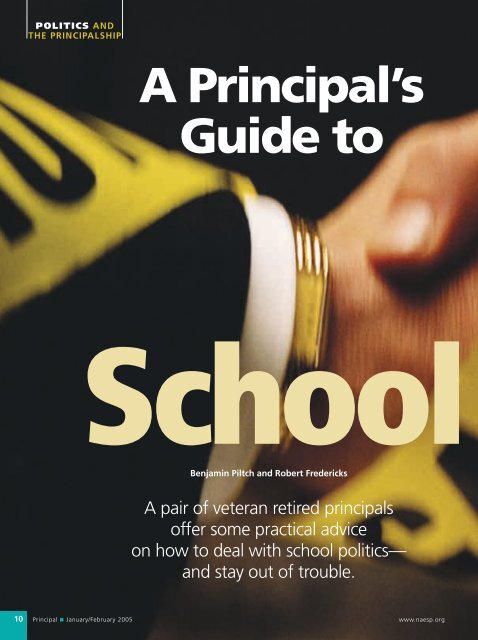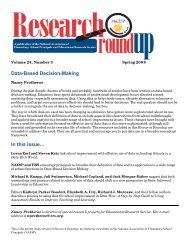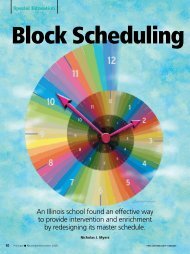A Principal's Guide to School Politics - National Association of ...
A Principal's Guide to School Politics - National Association of ...
A Principal's Guide to School Politics - National Association of ...
Create successful ePaper yourself
Turn your PDF publications into a flip-book with our unique Google optimized e-Paper software.
POLITICS ANDTHE PRINCIPALSHIPA Principal’s<strong>Guide</strong> <strong>to</strong><strong>School</strong>Benjamin Piltch and Robert FredericksA pair <strong>of</strong> veteran retired principals<strong>of</strong>fer some practical adviceon how <strong>to</strong> deal with school politics—and stay out <strong>of</strong> trouble.10Principal ■ January/February 2005www.naesp.org
<strong>Politics</strong>As a principal, it is almost impossible <strong>to</strong>avoid situations where political considerationsaffect your decision-making.You learn <strong>to</strong> live with it, but it can be difficultwhen you have <strong>to</strong> deal with rumors, inferences,innuendo, exaggerations, and outright lies.IN BRIEFThis article provides experience-basedsuggestions for principals on how<strong>to</strong> anticipate and avoid situationsinvolving political considerations indealings with parents, teachers,teacher unions, the central <strong>of</strong>fice,parent organizations, school boards,and community groups.100% RAG PRODUCTIONS, INC./TAXIPrincipal ■ January/February 2005 11
For example, we know <strong>of</strong> a principalwho was summoned by the superintendentafter he and a committee <strong>of</strong>teachers selected one <strong>of</strong> the school’sbest teachers <strong>to</strong> men<strong>to</strong>r two new teachers.The problem was that two sets <strong>of</strong>very politically savvy parents <strong>of</strong> childrenin the teacher’s class didn’t wanttheir children <strong>to</strong> lose her. They went <strong>to</strong>the school board and the board sentword <strong>to</strong> the superintendent <strong>to</strong> pressurethe principal <strong>to</strong> choose a differentmen<strong>to</strong>r.As it turned out, the only teacherwho met the superintendent’s criteria—anoutstanding veteran teacherwho would men<strong>to</strong>r the new teachersfor four periods a week—was the principal’soriginal selection. The issue wassettled quickly, but not before this“mini-crisis” cost the principal a week<strong>of</strong> sleepless nights and anxiety.Unpleasant situations like this ariseall the time in schools, but thereare ways for principals <strong>to</strong> minimizeaggravationand stay ou<strong>to</strong>f trouble “Ensure that all yourteachers receivetraining…in suchcontroversial areas ascorporal punishment…harassment, and sexeducation.”when dealing with their variousconstituencies.Parents and Teachers■ Establish uniform disciplinaryprocedures early in the year and makesure they are followed.■ Meet with teachers regularly <strong>to</strong>“sniff out” potential problems and planways <strong>to</strong> prevent them.■ Visit classes <strong>of</strong>ten so that if aparent complains about a teacher, youcan state that you have observed theteacher performing correctly and beable <strong>to</strong> describe what you saw. Forexample, if the accusation is that theteacher gives no homework, you cansay that you saw homework written onthe board during each visit <strong>to</strong> theteacher’s classroom.■ Discuss privately with teacherscomplaints about them that come <strong>to</strong>you from parents and children, but trynot <strong>to</strong> reveal the identity <strong>of</strong> those makingthe complaints. If you must revealthis information, make sure the teachersdo not punish children for theircomplaints or those <strong>of</strong> their parents.■ Make certain that teachers understandthat they are never <strong>to</strong> leave aclass unsupervised. A teacher who wassued for negligence when a childbroke his ankle in the gym was able <strong>to</strong>win the case when she could prove thatshe had <strong>to</strong>ld the class three times asthey left the gym <strong>to</strong> stay in line. Theboy had ignored her instructions andreturned <strong>to</strong> the gym <strong>to</strong> shoot basketswhen he was injured.■ Teachers should also be <strong>to</strong>ld that12Principal ■ January/February 2005www.naesp.org
they are not <strong>to</strong> meet alone with a childoutside <strong>of</strong> a normal classroom settingduring school hours, such as duringlunch or preparation time. Falseaccusations can be hard <strong>to</strong> disprovein such circumstances.■ Ensure that all your teachers receivetraining in keeping with districtpolicies and community values in suchcontroversial areas as corporal punishment,verbal and physical harassment,and sex education.Teacher Unions■ Keep the union leaders in yourschool informed <strong>of</strong> potential changesbefore the changes are introduced.■ Gain the trust <strong>of</strong> union leaders bybeing honest with them and involvingthem in discussions <strong>of</strong> new programsand current problems.■ Meet with union leaders at leas<strong>to</strong>nce a month and exchange agendaitems a few days in advance <strong>to</strong> avoidsurprises. These meetings will keepyou informed <strong>of</strong> the union’s concerns“Involve the unionin…plans <strong>to</strong> help weakteachers. This can helpminimize opposition whenit becomes necessary <strong>to</strong>initiate the terminationprocess…”and give you opportunities <strong>to</strong> makenecessary changes.■ Involve the union in setting upplans <strong>to</strong> help weak teachers. This canhelp minimize opposition when itbecomes necessary <strong>to</strong> initiate thetermination process for an incompetentteacher.The Central Office■ Read your superintendent’smemos carefully and share them withyour secretary, your assistant principal,and a few trusted teachers. Theirinsight, advice, and input will behelpful in framing your responses.■ Be sure <strong>to</strong> respond <strong>to</strong> all central<strong>of</strong>fice communication in a timelyfashion.■ Contact the central <strong>of</strong>fice immediatelyif there is an emergency. Don’twait until after the event.■ Develop good relationships withthe central <strong>of</strong>fice staff so that they willrespond <strong>to</strong> your concerns quickly.■ When attending required meetingswith your superintendent, askquestions regarding situations aboutwhich you are unclear. But if you havecomplaints or serious concerns, seethe superintendent or an appropriatecentral <strong>of</strong>fice administra<strong>to</strong>r privately.Parent Organizations■ Keep your school’s parent organizationfully informed <strong>of</strong> current issuesas well as any proposed changes.■ Attend their meetings and helpthem obtain interesting speakers oncurrent <strong>to</strong>pics. For example, onewww.naesp.org Principal ■ January/February 2005 13
principal was able <strong>to</strong> get a central <strong>of</strong>ficespeaker <strong>to</strong> describe the structure<strong>of</strong> the school’s physical education programafter parents raised concernsabout whether it was in compliancewith state and district regulations.■ Pay attention <strong>to</strong> concernsexpressed by members <strong>of</strong> your paren<strong>to</strong>rganization and follow up. If youdon’t have the answers, get back <strong>to</strong>them when you do.<strong>School</strong> Boards■ Although most school boardmembers are sincerely interested inseeing <strong>to</strong> the needs <strong>of</strong> the schools intheir district, there are some who runfor a school board seat because <strong>of</strong> thepower involved. Their requests <strong>of</strong>tenbecome very political and principalsneed <strong>to</strong> be extremely cautious.■ You don’t want <strong>to</strong> <strong>of</strong>fend schoolboard members by openly defyingthem, but you still must be ethical inresponding <strong>to</strong> their requests in anhonest and straightforward way.Community Groups■ Local organizations can be veryhelpful in obtaining funding for schoolprograms and equipment, providingvolunteers, and supporting yourschool’s reputation. But keep in mindthat the leaders <strong>of</strong> these organizationsare not experts on education and thatyou need <strong>to</strong> be careful about allowingthem <strong>to</strong> make decisions on sensitivematters. Even the perception that theyare making educational decisions canbe problematic.■ Attend as many meetings <strong>of</strong> localcivic associations and communitygroups as you can.“Be aware <strong>of</strong> what variousconstituencies…feel aboutyour school and what theywould like <strong>to</strong> see in thenear and distant future.”■ Get <strong>to</strong> know the key leaders andask <strong>to</strong> speak at their meetings. Givethem annual updates on school eventsand activities. A community group thatinitially opposed busing because membersfelt it would hurt neighborhoodproperty values changed its mind afterthe principal, who had spoken at each<strong>of</strong> their last six annual meetings,explained why busing would be goodfor the school. They had learned <strong>to</strong>trust his judgment.Universal Suggestions■ Be honest at all times. Keepeveryone in the loop with regard <strong>to</strong>concerns you know they will haveabout ongoing or future programs.■ Be aware <strong>of</strong> what various constituencies—parents,teachers, thecentral <strong>of</strong>fice, and the community—feel about your school and what theywould like <strong>to</strong> see in the near anddistant future.■ Maintain an open-door policy andwelcome those with concerns they wish<strong>to</strong> discuss with you.■ Whenever you leave the buildingduring the school day, be sure you <strong>to</strong>inform your secretary and designateyour assistant principal, if you haveone, or a lead teacher <strong>to</strong> act in yourabsence. Make sure your faculty knowswho your designee is and let the <strong>of</strong>ficestaff know where you are going so youcan be notified in an emergency.■ Notify all concerned when thereis a crisis. For example, if there is anoutbreak <strong>of</strong> pediculosis, notify teachersand parents <strong>to</strong> assure them that theschool nurse has the situation undercontrol.■ Encourage all constituencies <strong>to</strong>seek out all the facts, separating outpolitical implications, before jumping<strong>to</strong> conclusions on any issue. Set anexample by being knowledgeable, fair,understanding, <strong>to</strong>lerant, sincere,even-handed, and compassionate inyour behavior and decision-making. PBenjamin Piltch and Robert Fredericksare retired principals who are coauthoringa book on the principalship.Piltch’s e-mail address is bpiltch@bellsouth.net. Fredericks’ e-mail address isnbfred@aol.com.WEB RESOURCES“Dismissing the IncompetentTeacher,” published in StreamlinedSeminar in March 1999, has advicefor checking the political climatebefore beginning the dismissalprocess.www.naesp.org/ContentLoad.do?contentld=766Public Agenda reports on a nationalsurvey <strong>of</strong> concerns expressedby principals and superintendentsin Rolling Up Their Sleeves: Superintendentsand Principals Talk aboutWhat’s Needed <strong>to</strong> Fix Public <strong>School</strong>s.www.publicagenda.org/research_reports_details.cfm?list=9In “The Embattled Principal,”NAESP Executive Direc<strong>to</strong>r VincentFerrandino addresses some <strong>of</strong> thepolitical barriers faced by <strong>to</strong>day’sprincipals.www.naesp.org/ContentLoad.do?contentld=96614Principal ■ January/February 2005www.naesp.org
www.naesp.org Principal ■ January/February 2005 15

















